Still aren’t convinced that Mono is a trap which ultimately only benefits Microsoft?
Take a look at this “Highly Confidential” document from Microsoft (from Comes vs Microsoft case) entitled “Effective Evangelism” and decide for yourself. It exposes Microsoft’s game plan for dominating the market with their platforms (which we already know, but some choose to ignore).
Here are a few beauties from the included slide show:
“We’re Just Here to Help Developers[, Not]”
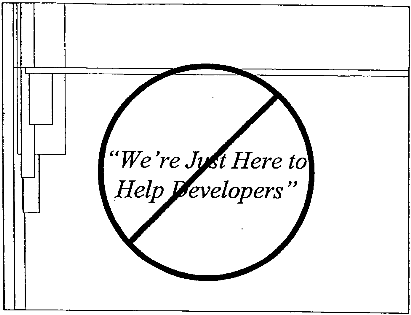
“We Are Here to Help MICROSOFT”
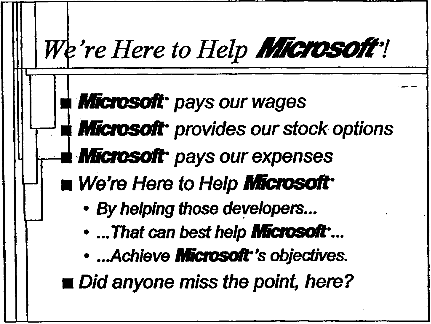
“Mission: Establish Microsoft’s platforms as de facto standards”
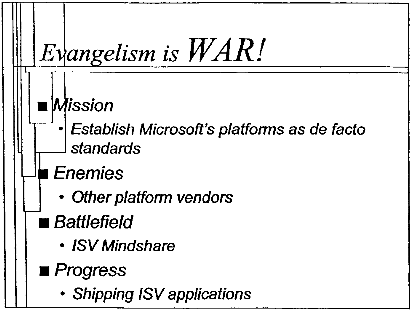
Mission Statement:
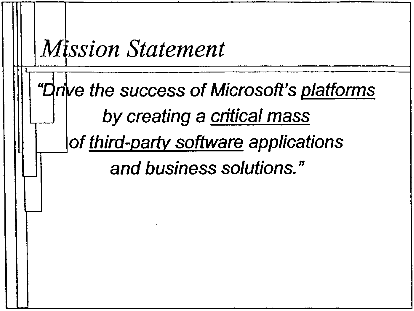
Microsoft wants everyone to use their APIs:
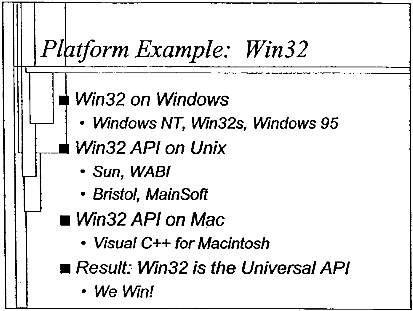
Only out to help themselves. Hello, Novell??:
“We fight for our ISV’s because we need their support for our own ends.”
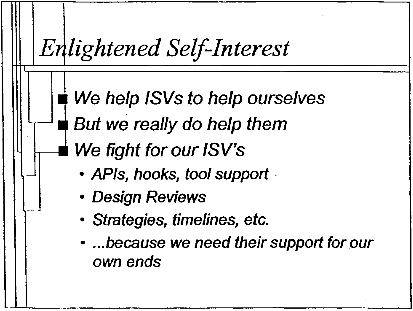
Could this be the plan for Mono?
“Put Win32 on Unix ourselves.. They pay us a fee and royalty.”
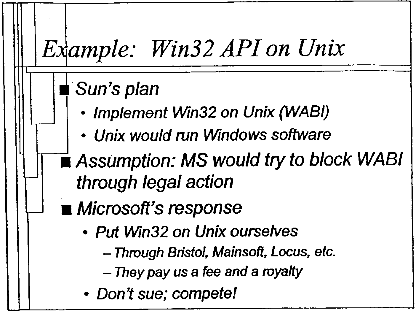
“Disrupt The Enemy’s Alliances”
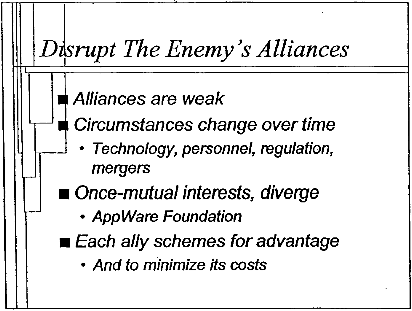
Fight, fight!
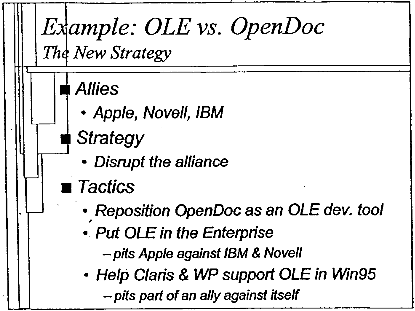
“You win when the enemy quits”
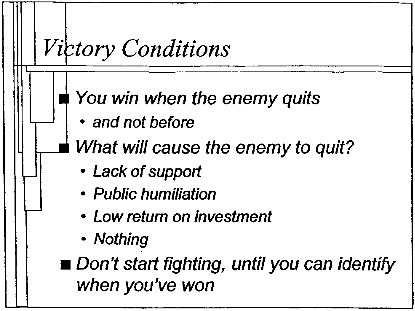
“We’re the good guys!”
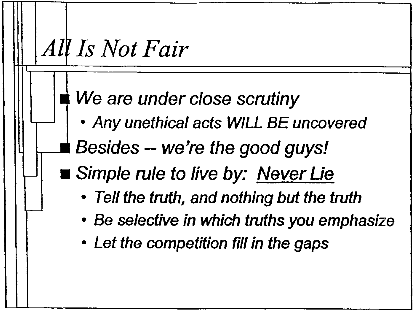
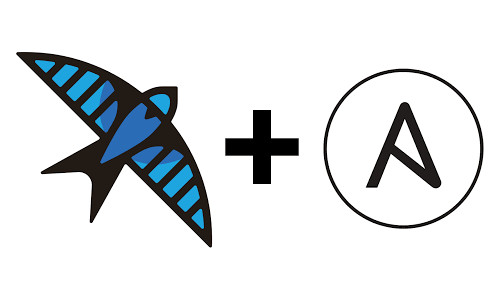
16 thoughts on “Mono is a trap – evidence”
… and yet, Mono is not “Microsoft evangelism” and is not mentioned in these slides. Microsoft have always had fairly controversial motivational techniques and aggressive business practices. So what?
I worry that you are too keenly associating yourself with the loony basket of faux Open Source advocates with this kind of stuff.
One key observation here is that Microsoft sees this as a battle that they cannot, will not lose. They never admit the possibility of defeat. They see everything in terms of defeating and dispersing the opposition, they phrase everything in terms of battles that they will win. This is an incredibly blinkered position, and it reminds me of the mindset of a gambler who insists on playing until they’ve won back their losses.
One might well say: never enter a battle until you have decided when you’ve lost.
The other thing that strikes me here and I have observed for a while now is that you can’t win if the other person isn’t playing the game. When developers (wherever they are) have tried to take on Microsoft, or tried to play them at their own game, Microsoft has won. When developers have simply gone about inventing their own things – the internet, better search engines, a portable media player that just works, their own Operating System, a vendor neutral document standard, wikis for online collaboration – Microsoft has been out of the game from the beginning. Microsoft keeps trying to compete, still labouring under the illusion that they must be the only game in town, but when people simply walk by them Microsoft stumbles and falls.
This is the strategy we must pursue – to not work with them but to develop something different and better. If you work with Mono, you’re allowing Microsoft to control your direction and block you.
Have fun,
Paul
Oh boy, here we go again with the “faux Open Source advocates” and terms like that. They were missed for some time but now comes again from a well-known source.
I think that people deserve themselves the right to comment, criticize and express their opinions about a lot of things, mono included. But when people ask for themselves the right to be the judge, the jury and the executioner of terms like that “”faux Open Source” thing, trying to impose on and on such a label on others it’s ridiculous! Who gives you such power? Do you even know and searched (you love and always ask for research, right?) about you are labeling that way? And why must we respect it? Come on. Looks like a fragile copy-and-paste, “spin master” thing, repeating over and over to see if it works.
Chris used the word “trap” on the title. Even if the slides does not show mono, you can make a connection, unless you’re have some issues. As pointed it show us some internal way of thinking of our “friends”. Maybe one can say “but those slides are very old”, but who can guarantee they changed? I won’t.
For those who can’t see the connection, Microsoft tries to get their technology to become the de facto standard and then collect royalties for it. If they can’t get royalties, they sue. Go ask Tom Tom about that.
So while these mention nothing about Mono or .NET directly, they are an insight into the mind of the beast. Note that I said “evidence” not proof. When in a court evidence is given to determine an entity’s character..
Their business practices haven’t changed – does anyone truly believe they are a friend of free software? If you do, then I can see why you don’t think there’s a problem.
Of course, this whole mess would disappear if Software Patents didn’t exist. Until then however, and in light of Microsoft collecting royalties from companies over free software implementations of their “technology,” we should be treading lightly.
Ask yourself why Miguel de Icaza ensured that Novell got patent protection from Microsoft for Mono..
-c
That’s the thing… he didn’t. Nat and Miguel didn’t know about the deal until it was very close to announcement. Why raise Miguel as an individual in this case?
I don’t think anyone truly believes that Microsoft is a friend to software freedom, but there’s a big difference between Microsoft (a company) and Mono (a Free Software project). Mono is both a pain and pleasure for Microsoft, and I think you too easily misjudge their “strategy” around it.
I look forward to similarly angry posts about how using Samba will control our future. It won’t happen, because Samba is acceptable to the lazy-brained, foot-stomping angry people.
Do you think Microsoft would sue anyone for OpenOffice.org implementing OOXML? For Samba? You have to start thinking critically about where they see the benefits from a Free Software project, and what they’ve done to facilitate the existence of it (and a whole bunch of other context around standards, EU monopoly cases and so on).
Well “Miguel” because he was the founder of Mono and a Novell employee. He touts the fact that Novell has protection from Microsoft and claims that the Community Promise vindicates his position. It doesn’t. If anything it proves that there is an issue, else why would Novell get patent protection?
Mono is a Novell project, and Novell’s business strategy is to make money from selling licenses for Microsoft’s patented technology.
Could Microsoft sue people over OOXML? Possibly. Part of the standardization process is a requirement to license the patents “under reasonable terms”. You can’t have a standard and sue everyone for using it, but you can for components outside the standard (like we see with Mono). However, this does raise another issue, in that standards should not be created and controlled by a company.
FAT should not be the de facto standard for USB memory sticks.
Do you think Microsoft would collect royalties from anyone using, I dunno, FAT in the kernel? Oh wait, they do.
Samba is acceptable to everyone because Microsoft cannot license or sue anyone over its use, thanks to their irrevocable royalty-free licensing agreement.
Why do you think Andrew Tridgell created this agreement in the first place? Because it’s necessary, and Mono has no such agreement.
Secondly, the Samba team deliberately codes AROUND patent issues.
The Mono project does not. Why? Because Novell needs Mono to be patent encumbered to sell licenses. Mono is also now being split into “free” and “non-free” components by Novell. This shows how it’s a risk.
This whole thing could be resolved if Microsoft offered their .NET technology under an agreement similar to what they did with SMB. Until they do that, Mono continues to be a problem.
Let’s make a list… Age of Samba. Age of Mono. Age of Microsoft agreement regarding Samba. Number of people waving their arms about in terror about Samba. Number of people waving their arms about in terror about Mono.
The Samba team deliberately codes around patents that they are aware of. Were the Mono team alerted to specific patents they would work around them — oddly enough, they have said this numerous times and from memory have already done it once or twice.
The Mono team is splitting into standards and non-standards parts in order to avoid risk, not to demonstrate that it exists (the risk always exists, with any project).
Finally, are you coding with Mono (particularly outside the standards chunks)? Are your friends? Are important projects you care about? If not, you may just be angrily pissing in the wind about something which is not particularly important.
Novell arranged patent protection for their customers because they thought it would be a handy-dandy differentiator so they could sell a bunch of SLES licenses to dumb customers who otherwise wouldn’t have bought them (remember that they also made a bunch of money selling SLES via Microsoft, which at the time — and considering their fortunes since — must’ve been a rather large draw card for them).
Are you also protesting against distributions which package and ship code which infringes on MPEG patents? Surely that is a bigger and more expensive issue than these piddling Mono related patents which no one can point at conclusively (you know, the ones which aren’t owned by Sun or cover C#/CLR standards)?
I mean, if you’re so angry about this, surely you’re angrier about the bigger problems, right?
(Note that I’m bothering to post here because you’re someone with whom I can see myself having a reasonable discussion about this… you’re not one of the completely faux-community idiot brigade. And I don’t like watching freedom loving friends throw faeces at freedom loving friends.)
🙂
Yes, I am against distributions which ship any software that might violate software patents.
This is one of the reasons I don’t like Ubuntu (that and the fact that Canonical is not a free software company).
It’s also one of the reasons that I really like Red Hat and Fedora – they make a stance against these things and actively promote free formats. That speaks volumes to me and is why I hold them in such high regard.
I also don’t like distros which violate the GPL by say, shipping pre-compiled closed source video drivers (not that anyone would do that!). Dum de dum..
The thing with MPEG (and other patent encumbered formats) is that it’s not forced onto the users. If a user has some data that they want to play, they can install it. That’s good, but I’d much prefer to see education about proprietary formats.
Perfectly good free software is not being pushed aside by MPEG, whereas with Mono we are throwing out good software (or rather not developing it further) and it’s also being thrust upon users. Many distros are now including Mono apps by default, as you’d be well aware. Miguel wants GNOME to be a Mono platform.
My concern is becoming dependant on Mono and .NET. Mono is not a bad project, quite the contrary – it’s good to have a free implementation of .NET, but writing our own free software in it is not something that sits right with me, yet.
Thrown out? Thrust upon? Say what?
He made an off-the-cuff comment about “GNOME 3 should be built on Mono” at the height of his pre-reality excitement about is new project. Miguel isn’t a GNOME developer these days (his principal work focus is Mono) and it’s not like the GNOME community en large is interested in or excited about Mono at all.
So: The people who create it love it…. the people who want it use it… the people who matter aren’t embracing it anyway… and the people who have always been irrelevant are going absolutely batshit insane about it.
Maybe the aggressive approach would have merit (or even be relevant) if there were anyone on the “other side” advocating Mono as vigorously and obnoxiously as those protesting against it.
Joe Shilds and Miguel are absolutely going batshit as you say, trying to promote Mono and are vigourously trying to defend their mono crap to everyone and anyone. They are the ones who are making the community respond with facts to their batty ideas on mono. they should not be developers for linux period. They should get out of linux and go work for redmond. They are traitors ….. FACT..
A year late but still… excellent article.
Waugh’s comments are predictable from the Mono defenders:
>>I mean, if you’re so angry about this, surely you’re angrier
>>about the bigger problems, right?
Geez Louise…. did he ask you if you stopped beating your wife too?
If ‘you’ care so much about a teeny-weenie itsy bitsie thing…. then its ‘you’ the problem.
Textbook.
Please dont let them silence you Chris.